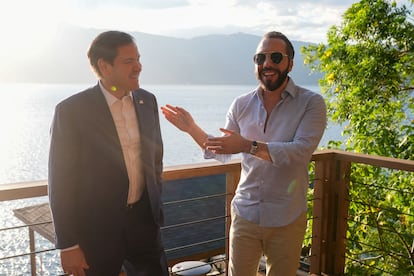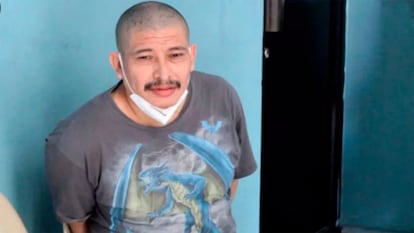The spring of Nayib Bukele’s relationship with Donald Trump
After months of rapprochement, El Salvador’s president is offering his prisons and hoping for financial support in his budding friendship with the Republican administration

On a sunset in front of a lake, two men look at each other and smile. “Friends,” Nayib Bukele titles his image with Donald Trump’s Secretary of State, Marco Rubio, in Coatepeque in El Salvador. After the click of the camera came the announcements: the Salvadoran president has offered his mega-prison, the so-called Terrorism Confinement Center, for prisoners sentenced in the United States; on the other side, the Republican administration has promised to help Bukele develop nuclear energy in the country. “Thank you very much, President,” Rubio posted on X, after describing the meeting as “very productive.” “Wonderful,” Elon Musk added, “great idea.” The posts, which were shared thousands of times, celebrate the launch of a new alliance in the region. It has had to wait a few years, but the spring of Bukele and the United States has already begun.
Marco Rubio’s visit to El Salvador — part of the American official’s first tour of Latin America — crystallized months of rapprochement. Last year, Bukele was one of the guests of honor at the Conservative Political Action Conference (CPAC), had meetings with Musk (whom he called “one of the great minds of our time”) and openly supported Trump’s return to power. The two leaders move in similar business and ideological circles. Enemies of what they call woke rhetoric — which includes human rights, feminism and environmental concerns — and defenders of “hard-line” politics, the two men lead the offensive of the far right. Their alliance seemed inevitable, and now they are looking to make it profitable on both sides.

“Bukele has been preparing for this moment for five years. He made a bet that Trump would be back, he put a lot of resources into lobbying for him,” the Salvadoran researcher Manuel Meléndez explains to EL PAÍS: “Very few world leaders celebrated Trump’s victory more than Bukele, it’s what he’s been longing for, it’s a very good moment for him.” The Central American president, who was re-elected last year, faces his second term much more protected than before, in a position that Trump’s support may end up strengthening.
The president controls all the branches of government: the executive, the legislative and also the judiciary, which allows him to pass constitutional reforms without obstacles, such as the one that authorized his own reelection. No one in El Salvador can oppose the Bukele clan without consequences. At the same time, he continues to enjoy immense popularity, with some polls giving him an approval rating above 90%. “It is a very popular and very authoritarian government that seems invincible at times, but which does face certain threats: one of them is a legal scandal in the United States,” says Meléndez, who is working on a PhD in democracy and government at Harvard. “It is one thing for El Faro [a digital media outlet] to reveal the pact with the gangs, and another for there to be a sentence in a U.S. court. This does not let Bukele sleep at night.”
The researcher believes that a priority objective for the president is to achieve the extradition to El Salvador of the gang leaders imprisoned in the United States, such as El Crook, who are aware of his government’s negotiations with the gangs, a fact that Bukele has always denied. Another key goal of his relationship with Trump, he notes, would be to end the U.S. cooperation funds with which independent newspapers and associations in El Salvador manage to survive: “The few check and balances that remain in El Salvador have survived thanks to these funds. Bukele knows that if the U.S. withdraws its support, these actors that are very uncomfortable for him could disappear.”
The Salvadoran president himself said that this issue was one of the first he spoke about with Trump when he won the elections last year. “If ‘the only thing’ that Bukele achieves in his relationship with Trump is those two things, it is already a huge victory,” the researcher believes.

In addition, the Salvadoran leader faces a new challenge in his second term: economic pressure. He has just obtained support from the International Monetary Fund (IMF), in exchange for no longer considering bitcoin as the official currency in El Salvador, but the situation in the country remains complex. “The Salvadoran economy is fragile, it has enormous challenges in the fight against poverty and inequality,” explains Élodie Brun, from the Colegio de México, “and obtaining help from the United States to obtain support bilaterally or multilaterally could be a priority.” Leandro Morgenfeld, from the National Scientific and Technical Research Council of Argentina, agrees: “Bukele has a very strong financial need. And nothing is done at the IMF without the approval of the United States, which is the only one with the right to veto. Bukele’s act of total submission is in order to obtain this support.”
An outsourced prison
Bukele continues to boast of having put an end to gangs and insecurity in the country, after having imprisoned more than 83,000 people (the organization Socorro Jurídico estimates that more than 3,000 were arbitrarily detained, without any link to the gangs). Deaths due to torture and lack of medical care in prisons have skyrocketed: prisoners die of hunger, accused without evidence and without the right to a trial inside Salvadoran prisons. But none of these complaints of human rights violations from local and international bodies matter to Bukele, much less to Donald Trump.
The Republican government has welcomed Bukele’s proposal to outsource part of the U.S. prison system to El Salvador. “It is an extraordinary gesture never before made by any country,” wrote Marco Rubio. “His commitment to accept and imprison criminals from any country, including those from violent gangs like MS-13 and Tren de Aragua, will make the United States a safer country,” celebrated the Secretary of State, without considering any of the legal questions raised by this proposal, which includes U.S. citizens and legal residents.
“This proposal can also clear up a dilemma for Trump regarding mass deportations, which is what to do with those migrants that he cannot return to their countries of origin,” says Brun, an expert in international relations in Latin America. In addition, the researcher mentions other benefits for the American president of this “favorable relationship”: “Part of Bukele’s power is symbolic, because he is a figure that inspires far-right leaders, which is useful for Trump, who also wants to have as many allies as possible.”
The link between the two cannot be understood without the wider Latin American framework. The Republican leader has started his second term with a very aggressive tone that includes everything from the threat of tariffs on Mexico and Colombia (in addition to Canada) to his boisterous talk of annexing the Panama Canal. “The relationship between Bukele and Trump must be read as part of Trump’s initiative to put a wedge between the main governments in the region, break political coordination and try to counteract Mexico, Brazil, Colombia and Chile, which are in the hands of social democratic or left-wing governments not allied with him,” explains Leandro Morgenfeld, who coordinates the study group on the U.S. of the Latin American Council of Social Sciences (CLACSO).
On this divided playing board, Trump has the staunch support of Javier Milei, who since being elected president of Argentina has traveled to the United States nine times (one of them for the Republican’s inauguration); and that of Daniel Noboa, from Ecuador, or Santiago Peña in Paraguay. “It is an example of how Trump’s corollary of the Monroe Doctrine operates: threats to governments that do not submit, and very neocolonial initiatives for those that do, as in Argentina and El Salvador, which are following American policies,” says Morgenfeld, also a professor at the University of Buenos Aires.
“We have to consider the sustainability of this relationship over time, as happens with many of Trump’s alliances, because they are very complicated characters,” adds Élodie Brun. ”Everything seems to indicate that they will get along well, but their agendas are not always the same. It is difficult to see it at the moment, but it could hypothetically be a limit on human rights or even Gaza, because Bukele is of Palestinian descent, although he hates Hamas because he is a Christian, his father converted to Islam. I don’t think they have the same position there.” But it is still early, for now: the idyll is just beginning.
Sign up for our weekly newsletter to get more English-language news coverage from EL PAÍS USA Edition
Tu suscripción se está usando en otro dispositivo
¿Quieres añadir otro usuario a tu suscripción?
Si continúas leyendo en este dispositivo, no se podrá leer en el otro.
FlechaTu suscripción se está usando en otro dispositivo y solo puedes acceder a EL PAÍS desde un dispositivo a la vez.
Si quieres compartir tu cuenta, cambia tu suscripción a la modalidad Premium, así podrás añadir otro usuario. Cada uno accederá con su propia cuenta de email, lo que os permitirá personalizar vuestra experiencia en EL PAÍS.
¿Tienes una suscripción de empresa? Accede aquí para contratar más cuentas.
En el caso de no saber quién está usando tu cuenta, te recomendamos cambiar tu contraseña aquí.
Si decides continuar compartiendo tu cuenta, este mensaje se mostrará en tu dispositivo y en el de la otra persona que está usando tu cuenta de forma indefinida, afectando a tu experiencia de lectura. Puedes consultar aquí los términos y condiciones de la suscripción digital.









































